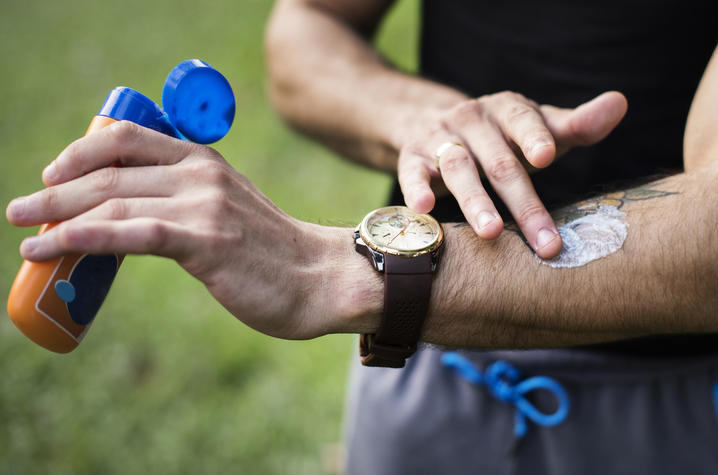Having sun-safe summer fun by protecting your skin

The University of Kentucky Public Relations and Strategic Communications Office provides a weekly health column available for use and reprint by news media. This week's column is by John D’Orazio, M.D., Ph.D., division chief for pediatric oncology, hematology and oncology at UK HealthCare, who researches skin cancer at the UK Markey Cancer Center.
LEXINGTON, Ky. (June 10, 2024) — Spending time outside in the summer is a great way to stay active, reduce stress and get vitamin D. It’s also important to make sure your skin is protected during your time outdoors.
Too much sun can cause skin cancer — the most common cancer in the U.S. Most skin cancers are caused by too much exposure to ultraviolet (UV) light, which can damage skin cells.
Protecting your skin from UV rays is important all year long and not just during the summer. You can also be exposed to UV rays on cloudy or cool days.
Here are steps you can take to protect your skin from the sun:
Sunscreen: Use a broad-spectrum sunscreen that filters out two types of UV rays: UVA and UVB. It should also have a sun protection factor (SPF) of 15 or higher. Put a thick layer of sunscreen everywhere that will be exposed to the sun at least 20 minutes before going outside.
It’s also important to reapply your sunscreen because it does wear off. If you’re out in the sun for more than two hours or swimming, sweating or toweling off, you need to reapply.
Make sure your sunscreen isn’t expired. It’s shelf life is no more than three years and shorter if it’s been exposed to high temperatures.
Sunglasses: In addition to protecting your eyes from UV rays, sunglasses also protect the more delicate skin around your eyes from sun exposure. Most sunglasses sold in the U.S. block both UVA and UVB rays.
Hats and clothing: Hats with a brim all the way around that shades your face, ears and the back of your neck offer the most protection. Canvas works best and you should avoid straw hats that let too much sunlight through. If you wear a baseball hat, you should also protect your ears and the back of your neck with clothing, sunscreen or staying in the shade.
Long-sleeved shirts and long pants and skirts can also provide you some protection from UV rays. Clothing made from tightly woven fabric offers the best protection as well as darker colors.
Shade: You still need to wear sunscreen or protective clothing even when hanging out in the shade. Staying under an umbrella, tree or other covering can help you reduce your risk of sun damage and skin cancer. Taking breaks in shaded areas is also key on long days outside.
Other ways to stay sun safe include planning activities in the morning or late afternoon to avoid the most exposure to the sun.
Sunburn: A sunburn usually shows up four hours after being exposed to the sun, gets worse for about 24 hours and then fades in 3-5 days.
Treatment: You can take an over-the-counter pain reliever to help with the pain of a sunburn. A cool, wet cloth can also offer relief as well as applying aloe or moisturizer. It’s important to drink plenty of water to stay hydrated.
If you have blisters, don’t break them. Lightly bandage the area to prevent infection. If more than 15% of your body is sunburned, you’re in pain for more than 48 hours or have a fever of above 101 degrees, seek medical attention.
If you’re sunburned, avoid more time in the sun until your skin has healed.
UK HealthCare is the hospitals and clinics of the University of Kentucky. But it is so much more. It is more than 10,000 dedicated health care professionals committed to providing advanced subspecialty care for the most critically injured and ill patients from the Commonwealth and beyond. It also is the home of the state’s only National Cancer Institute (NCI)-designated Comprehensive Cancer Center, a Level IV Neonatal Intensive Care Unit that cares for the tiniest and sickest newborns and the region’s only Level 1 trauma center.
As an academic research institution, we are continuously pursuing the next generation of cures, treatments, protocols and policies. Our discoveries have the potential to change what’s medically possible within our lifetimes. Our educators and thought leaders are transforming the health care landscape as our six health professions colleges teach the next generation of doctors, nurses, pharmacists and other health care professionals, spreading the highest standards of care. UK HealthCare is the power of advanced medicine committed to creating a healthier Kentucky, now and for generations to come.




